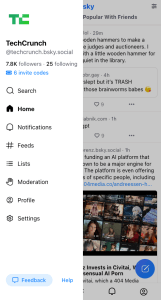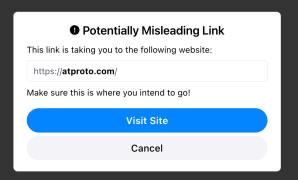Is the grass greener on the other side? We’re not sure, but the sky is most certainly bluer. It’s been almost two years since Elon Musk purchased Twitter, now X, leading people to set up shop on alternative platforms. Mastodon, Post, Pebble (which has already shuttered operations) and Spill have been presented as potential replacements, but few aside from Meta’s Threads have achieved the speed of growth Bluesky has reached.
After being invite-only for almost a year, Bluesky became open to anyone in February 2024 and gained almost 800,000 new users in a day. As of September 2024, Bluesky has over 9 million users, thanks to an influx of users after X was banned in Brazil. While the number is promising, the network has a lot of catching up to do to compete with Threads’ 130 million monthly active users or even Mastodon’s 1.8 million.
What is Bluesky?
Bluesky is a decentralized social app conceptualized by former Twitter CEO Jack Dorsey and developed in parallel with Twitter. The social network has a Twitter-like user interface with algorithmic choice, a federated design and community-specific moderation.
Bluesky is using an open source framework built in-house, the AT Protocol, meaning people outside of the company have transparency into how it is built and what is being developed.
Dorsey introduced the Bluesky project back in 2019 while he was still Twitter CEO. At the time, he said Twitter would be funding a “small independent team of up to five open source architects, engineers, and designers,” charged with building a decentralized standard for social media, with the original goal that Twitter would adopt this standard itself. But that was before Elon Musk bought the platform, so Bluesky is completely divorced from Twitter.
As of May 2024, Dorsey is no longer on Bluesky’s board. Bluesky is now an independent public benefit corporation led by CEO Jay Graber.
How do you use Bluesky?
Upon signing up, users can create a handle which is then represented as @username.bsky.social as well as a display name that appears more prominent in bold text. If you’re so inclined, you can turn a domain name that you own into your username — so, for example, I’m known on Bluesky as @amanda.omg.lol.
The app itself functions much like a bare-bones Twitter, where you can click a plus button to create a post of 256 characters, which can also include photos. Posts themselves can be replied to, retweeted, liked and, from a three-dot menu, reported, shared via the iOS Share Sheet to other apps, or copied as text.
You can search for and follow other individuals, then view their updates in your “Home” timeline. Previously, the Bluesky app would feature popular posts in a “What’s Hot” feed. That feed has since been replaced with an algorithmic and personalized “Discover” feed featuring more than just trending content.
For new users, Bluesky introduced a “Starter Pack” feature, which creates a curated list of people and custom feeds to follow in order to find interesting content right out of the gate.
User profiles contain the same sort of features you’d expect: a profile pic, background, bio, metrics and how many people they’re following. Profile feeds are divided into two sections, like Twitter: posts and posts & replies.
There is also a “Discover” tab in the bottom center of the app’s navigation, which offers more “who to follow” suggestions and a running feed of recently posted Bluesky updates.

Who’s on Bluesky?
By the beginning of July 2023, when Instagram’s Threads launched, Bluesky topped a million downloads across iOS and Android. Notable figures like Neil Gaiman, Dril and Chelsea Manning have migrated to Bluesky. It’s also home to news organizations like Bloomberg, The Washington Post and Engadget. Since August 2024, Bluesky is also now allowing heads of state to sign up and join the platform for the first time.
Does Bluesky work just like X?
In many ways, yes. Up until recently, Bluesky did not have DMs like X, but that has since been implemented. However, DMs on Bluesky are currently limited to one-to-one messages, not group messages. Bluesky has also said it is interested in implementing something similar to X’s Community Notes feature. Additionally, X does not use a decentralized protocol like ActivityPub or AT.
While Bluesky was initially kicked off as a project convened by Jack Dorsey in 2019 when he was CEO of Twitter, the social app has been an independent company since its inception in 2021.
Is Bluesky free?
Yes, and it is now open to the public.
How does Bluesky make money?
Bluesky’s goal is to find another means to sustain its network outside of advertising with paid services, so it can remain free to end users. On July 5, Bluesky announced additional seed round funding and a paid service that provides custom domains for end users who want to have a unique domain as their handle on the service.
Is Bluesky decentralized?
Yes. Bluesky’s team is developing the decentralized AT Protocol, which Bluesky was built atop. In its beta phase, users can only join the bsky.social network, but Bluesky plans to be federated, meaning that endless individually operated communities can exist within the open source network. So, if a developer outside of Bluesky built their own new social app using the AT Protocol, Bluesky users could jump over to the new app and port over their existing followers, handle and data.
“You’ll always have the freedom to choose (and to exit) instead of being held to the whims of private companies or black box algorithms. And wherever you go, your friends and relationships will be there too,” a Bluesky blog post explained.
Is Bluesky secure?
In October 2023, Bluesky added email verification as part of a larger effort to improve account security and authentication on the network. The addition is an important step forward in terms of making Bluesky more competitive with larger networks like X, which have more robust security controls. In December 2023, Bluesky allowed users to opt out of a change that would expose their posts to the public web following backlash from users.
Is Bluesky customizable?
Yes. In May 2023, Bluesky released custom algorithms, which it calls “custom feeds.” Custom feeds allow users to subscribe to multiple different algorithms that showcase different kinds of posts a user may want to see. You can pin custom feeds that will show up at the top of your timeline as different tabs to pick from. The feeds you pin, or save, are located under the “My Feeds” menu in the app’s sidebar.
In March 2024, the company announced “AT Protocol Grants,” a new program that will dole out small grants to developers in order to foster growth and customization. One of the recipients, SkyFeed, is a custom tool that lets anyone build their own feeds using a graphical user interface.
Is Bluesky on iOS and Android?
Yes. Bluesky rolled out to Android users on April 20 and was initially launched to iOS users in late February. Users can access Bluesky on the web here.
Are Bluesky posts really called ‘skeets?’
There is technically no name for posts, but internet users have adopted the name “skeets,” a portmanteau of “tweet” and “sky.” Users still widely refer to posts as “skeets,” despite protests from Bluesky CEO Jay Graber and others who don’t find the slang amusing.
How does Bluesky tackle misinformation?
After an October 2023 update, the app will now warn users of misleading links by flagging them. If links shared in users’ posts don’t match their text, the app will offer a “possibly misleading” warning to the user to alert them that the link may be directing them somewhere they don’t want to go.

Has Bluesky had any controversies?
Bluesky has been embattled with moderation issues since its first launch. The app has been accused of failing to protect its marginalized users and failing to moderate racist content. Following a controversy about the app allowing racial slurs in account handles, frustrated users initiated a “posting strike,” where they refused to engage with the platform until it established guardrails to flag slurs and other offensive terms in usernames.
What moderation features does Bluesky have?
A December 2023 post from the Bluesky Safety account announced a large batch of moderation updates.
Bluesky is rolling out “more advanced automated tooling” designed to flag content that violates its Community Guidelines that will then be reviewed by the app’s moderation team.
Bluesky launched moderation features similar to ones on X, including user lists and moderation lists, the latter of which can be used to mute or block many users at once. The app is also developing a feature that lets users limit who can reply to posts.
Some Bluesky users are still advocating for the ability to set their accounts to private — a feature they have an increased need for after Bluesky announced it would launch a public web interface.
In March 2024, the company launched Ozone, a tool that lets users create and run their own independent moderation services that will give users “unprecedented control” over their social media experience.
What’s the difference between Bluesky and Mastodon?
Though Bluesky’s architecture is similar to Mastodon’s, many users have found Bluesky to be more intuitive, while Mastodon can come off as inaccessible: Choosing which instance to join feels like an impossible task on Mastodon, and longtime users are very defensive about their established posting norms, which can make joining the conversation intimidating. To remain competitive, Mastodon recently simplified its sign-up flow, making mastodon.social the default server for new users.
However, the launch of federation will make it work more similarly to Mastodon in that users can pick and choose which servers to join and move their accounts around at will.
Who owns Bluesky?
Though Jack Dorsey funded Bluesky, he is not involved in day-to-day development and no longer sits on the company’s board. The CEO of Bluesky is Jay Graber, who previously worked as a software engineer for the cryptocurrency Zcash, then founded an event-planning site called Happening.
If you have more FAQs about Bluesky not covered here, leave us a comment below.
Source link
 meganwoolsey Home
meganwoolsey Home


